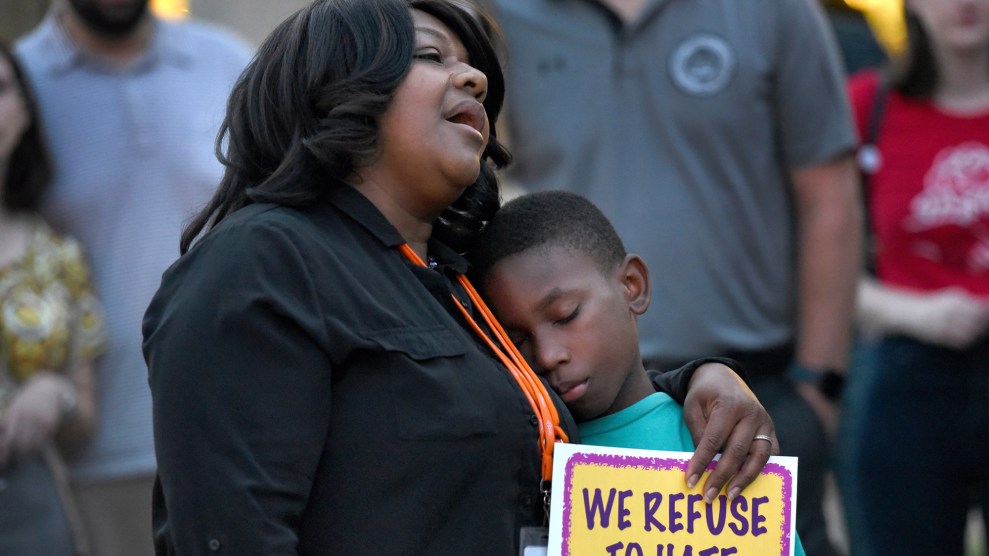When the major media outlets finally called the presidential election for Joe Biden, huge numbers of people around the country took to the streets to celebrate. But as they popped champagne, danced alongside their neighbors, and cried tears of joy, the question of what would come next loomed ominously. The election may have been a referendum on a second Trump term, but with more than 70 million votes in his favor, it was clearly not a referendum on Trumpism, or on the deep injustices that animated his rise to power and captivated large swaths of Americans.
Still, now that he has been defeated, let’s take one last look (promise!) at Trump’s history of racism. In the 1970s, the Department of Justice sued him for refusing to rent to Black people. After a white woman was raped in New York City’s Central Park in 1989, he called for the five Black and Brown teenagers who were wrongfully accused to be executed—and kept railing against them even after DNA evidence proved their innocence. And then came his obsession with Barack Obama’s birth certificate. Trump’s presidential run began with his description of Mexican immigrants as rapists and criminals, a foreshadowing of a presidency in which anyone perceived as different or disagreeing with him would be subjected to taunting tweets, at best, and cruel policies, at worst. Trump and his sycophants banned Muslims from entering the country, separated children from their parents at the border, and blocked refugees from settling here. But we know all this.
The danger in treating Trump like some kind of aberration, like a stranger in the night who caught democracy off guard, is that we end up falsely believing that just one simple act like, say, voting for his opponent, can restore decency to a nation. But last summer’s racial reckoning, in which millions of people finally began to understand what Black people have known all along, proved that even well-intentioned liberals had no idea how serious the problem of deeply entrenched white supremacy is. Trump would not have been so successful in his campaign of racism and hate if this country weren’t filled with many opportunities to exploit those feelings.
Consider how Trump and his enablers responded to his defeat. Rather than acknowledging the loss and engaging in a peaceful transition, they filed frivolous lawsuits alleging that votes in Philadelphia, Detroit, and Atlanta were “illegal.” (His loyal attorney and consigliere Rudolph Giuliani tweeted: “The only thing that would have surprised me is if Philly didn’t cheat on a big scale in the 2020 election. It would have been the first time they missed such an opportunity in 60 years.”) Not coincidentally, these epicenters of Black voters helped secure Biden’s election. The message was clear: Black people who voted for Biden are illegitimate. These outlandish claims did not succeed in overturning the election results, but they normalized yet another authoritarian maneuver and provided Republicans with a playbook for future races. This tactic did not come out of the blue: For decades the GOP has been spinning tales about voter fraud and has attempted to disenfranchise Black and Brown communities with voter ID requirements and other laws. Trump’s cries of rigged votes and his demands for pointless recounts were one last grift with disturbing consequences for marginalized people. They were also a fitting end to his chaotic and racist presidency.
When assessing how a demagogue rises to power, history’s turning points are edifying. The Emancipation Proclamation, the Civil Rights Act, and the election of the first Black president were each met with backlash—or whitelash. Jim Crow laws, lynchings, and the Southern strategy led to the modern-day GOP and, of course, to Trump. An American autocrat was always going to rise to power via racism. According to political scientists Nicholas Davis and Steven Miller, “the one constant thread woven throughout American democracy is that white Americans’ track record regarding matters of racial and democratic equality is poor.” Democracy is undermined when intolerant white people realize it’s a system designed to extend basic rights to everyone.
If we are to prevent the rise of an even more cunning authoritarian leader, we must somehow resolve the vulnerabilities and immorality in our system that Trump expertly manipulated. Because even though Trump’s worst onslaughts came against marginalized groups, the policies that are born of racism don’t spare white people. Consider the coronavirus. People—disproportionately people of color—who had no choice but to go to their front-line jobs became cannon fodder for the virus. And as COVID first exploded in cities where Black and Brown people live, the white people who rejected science in favor of “freedom” convinced themselves that mask-wearing was part of a conspiracy, or at least not their responsibility. Inevitably the virus then stormed through white communities—not to mention the White House.
There are signs that a Biden presidency may be the beginning of racial reconciliation. His administration will set up a task force to study COVID-19 racial disparities, a recognition that people of color getting sicker is not an aberration but a feature of our unequal society. But first there must be some consensus about what racial reconciliation means. Even well-meaning people have found it difficult to accept that there is a sickness that goes much deeper than Trump.
It will be good to have a president who won’t defend armed white people who kill protesters, and will not see the presidency as a vehicle to enrich himself and his family members. But, at least for this Black woman, after 400 years of white supremacist ideology devaluing our lives, that is not enough. Biden must commit to having racial impacts factored into all his policies. While the GOP has offered nothing but grievance politics and managed to convince its base to endure misery so long as people of color are more miserable, Biden’s presidency can prove that what’s good for Black people—health care, housing, ending the pandemic, fighting climate change—is good for us all.
But this will not happen unless white Americans (or enough of them) also commit to that process of self-examination. No sooner did election results start to appear than the commentary began, bemoaning the notion that various groups of Black and Brown people didn’t show up at the polls in the numbers that had been projected. It’s time for white Americans to turn their electoral critique inward. Trump became president because a majority of white people voted for him in 2016. Biden did not win in a landslide for the same reason. Instead of shallow narratives about how Brown and Black voters didn’t do what was expected of them, the scrutiny needs to be turned around: How many people in your community voted for him?
An honest assessment of who we actually are as a country can’t happen until the white vote, and whiteness more broadly, is examined. Nearly half of all voters still chose Trump. Tens of millions took stock of the catastrophic handling of the coronavirus pandemic, the widespread economic suffering that Trump and the Republicans have done little to reverse, and the terrifying increase of white supremacist violence, and decided: This is the America we want. And that’s a problem that will endure long after Trump is gone.









